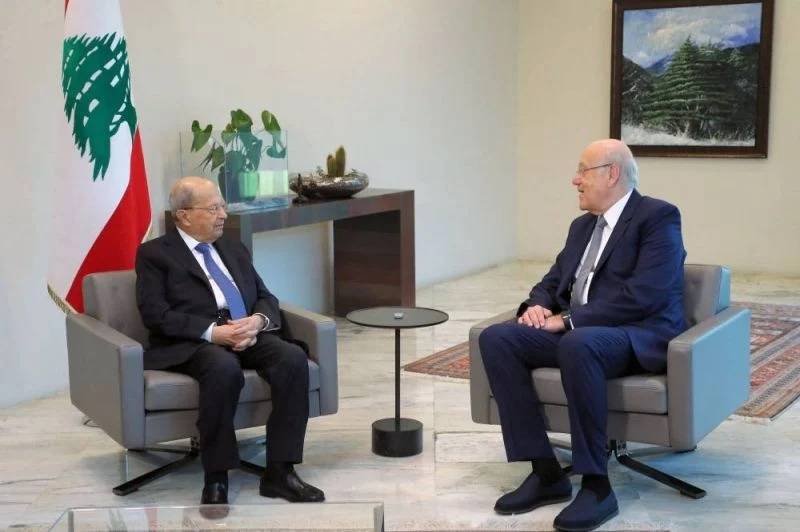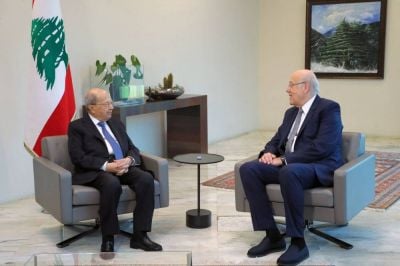
President Michel Aoun and the Prime Minister-designate Najib Mikati during a previous meeting in Baabda. (Credit: Dalati and Nohra)
One would think that President Michel Aoun and Prime Minister-designate Najib Mikati have beaten their swords into a plowshare since the talks to form a new ministerial team surprisingly resumed a few days ago. But that is not the case.
On the contrary, the war of statements between Baabda and the Grand Serail has been in full swing, and was even joined by Dar al-Fatwa, the top Sunni religious authority.
In a statement issued after a meeting, held under the chairmanship of Grand Mufti Abdel Latif Derian, the Islamic Council frowned on “a phenomenon that does not go in line with the norms, which is represented in circumventing the issue of electing a president and focusing on the formation of a new cabinet or the reshuffling of the current ministerial team chaired by Najib Mikati” amid a controversy deemed fake.
“Lebanon needs a new president who respects his constitutional oath and commits to its implementation, especially after the series of positions that neither respect the spirit of the Constitution, nor the Taif Agreement nor the pact of living together,” the statement added.
Encroachment on the prime minister’s powers
After Dar al-Fatwa’s statement emerged, the presidency stressed in a press release on Saturday its commitment to “the national partnership.”
“President Aoun’s position on the cabinet formation is based on the need to preserve the national partnership and the document of national understanding, as well as on the importance of maintaining the positive atmosphere,” Baabda’s press office said.
“The head of state respects his oath regarding the presidential election. During his term, he has exercised his prerogatives and has not perjured his oath,” the text added.
It also denounced the “false allegations by some journalists and politicians who want to stir up sectarian strife.” This clarification was issued as more and more political analysts believe that Aoun could decide to stay in the Baabda Palace after the end of his term.
On Thursday, Aoun said, as cited by the President of the Maronite League Khalil Karam who visited Baabda, that the caretaker cabinet cannot assume the presidential powers in case of a vacancy in Baabda.
Analysts in some local media outlets reported that the Aounist camp, in tandem with the Parliament, could strip Mikati from his designation to form the next cabinet. Many believe that this option is tantamount to an encroachment on the Sunni prime minister’s powers by the Maronite president.
It is in this vein that Mikati himself issued a statement on Thursday, expressing his surprise to see “some people using the presidency’s platform to express sectarian positions,” in reference to various statements made by the Aounist camp.
Pressuring to form a cabinet
While the political tug-of-war over the formation of the next ministerial team has taken a sectarian turn, the prospect of setting up a new cabinet has not been laid to rest.
Pressure continues to be exerted by the various political blocs to this end. According to available information, both Hezbollah and Amal are working along the same line, in order to avoid a serious controversy once Aoun’s term is over.
This is because while Nabih Berri, the head of the Amal movement, is an ally of Mikati, he fears that Aoun could use the total vacuum in the executive branch as an excuse to stay in Baabda.
According to information obtained by L’Orient-Le Jour, Berri would express a firm position on the cabinet formation in his discourse next Wednesday on the 44th commemoration of the disappearance of the movement’s founder, Imam Moussa Sadr.
Informed political sources told L’Orient-Le Jour that Aoun is now open to the idea of maintaining a cabinet of 24 ministers, while he previously called for the incorporation of six ministers of state that would represent the various political parties without having portfolios, bringing the total number of ministers to 30.
In addition, he reportedly explained to Mikati that he does not have a problem with Mikati choosing successors to caretaker Economy Minister Amin Salam and caretaker Minister of Displaced Issam Charafeddine.
“A fifth meeting will probably take place this week between Mikati and Aoun so as to carry on with their negotiations,” a source close to Mikati confirmed.
According to a spokesperson for the Free Patriotic Movement, which was founded by Aoun, “the president insists on the need to form a cabinet.” The spokesperson went on to deny the claim that he has definitively given up the option of forming a cabinet of 30 ministers.
This article was originally published in French in L'Orient-Le Jour. Translation by Joelle El Khoury.
